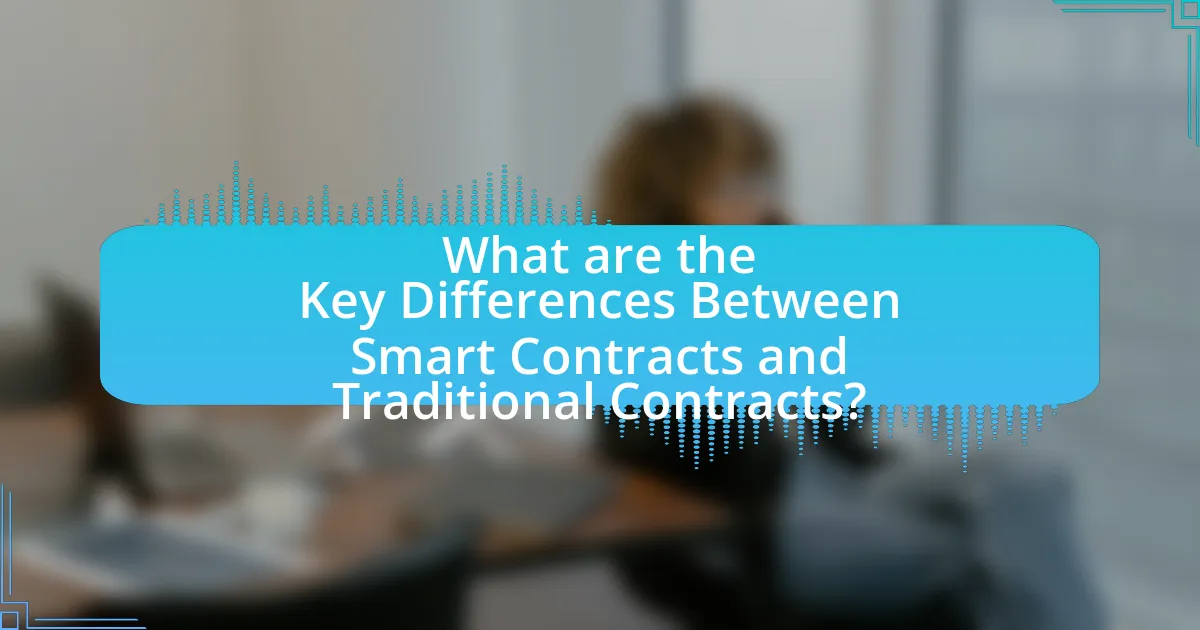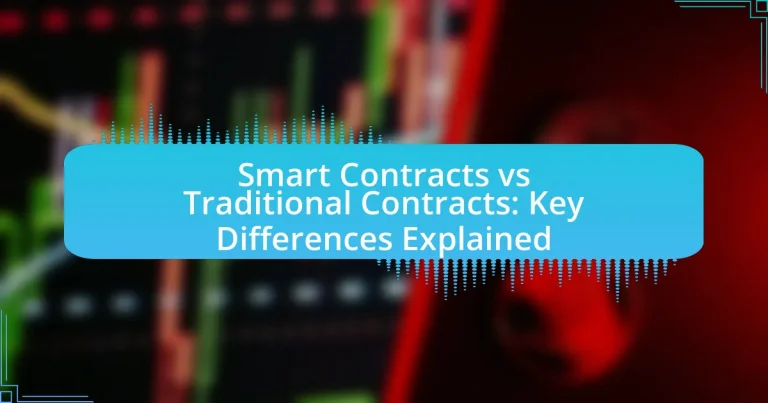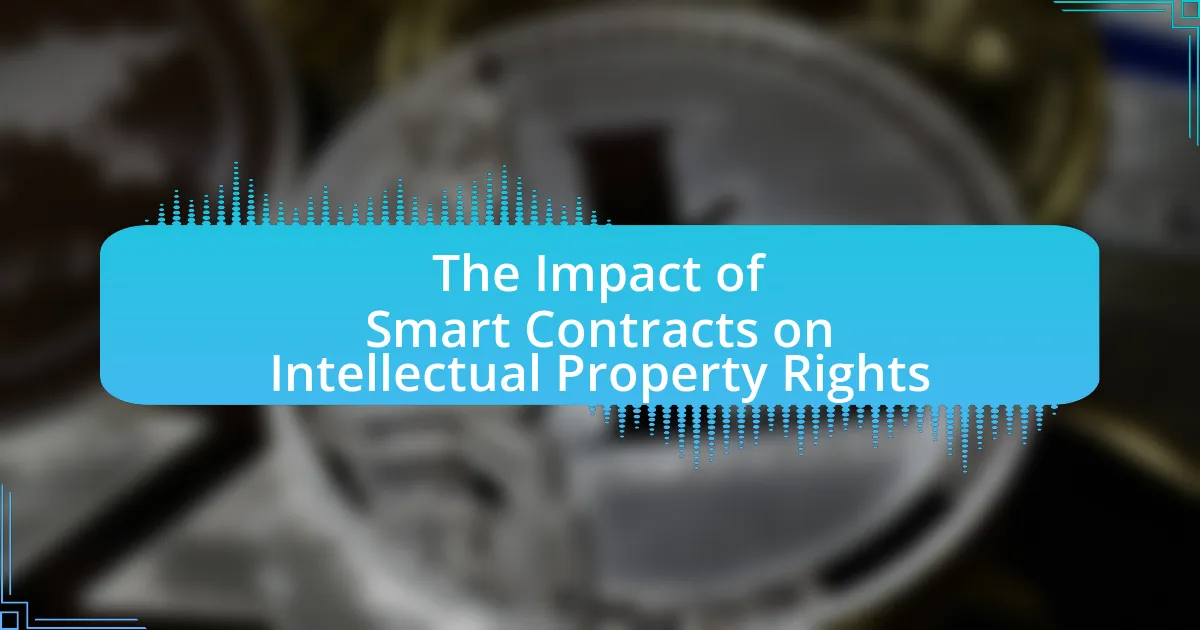Smart contracts are self-executing agreements with terms encoded in blockchain technology, offering automation, transparency, and security, in contrast to traditional contracts that require manual enforcement and legal frameworks. This article explores the fundamental differences between smart contracts and traditional contracts, detailing their functionalities, legal implications, and the technology that underpins them. Key characteristics, advantages, and limitations of both contract types are examined, alongside their respective enforcement mechanisms and cost implications. Additionally, the article addresses the transition process for businesses moving from traditional to smart contracts, highlighting best practices and potential pitfalls to avoid.

What are Smart Contracts and Traditional Contracts?
Smart contracts are self-executing contracts with the terms of the agreement directly written into code, operating on blockchain technology, which ensures transparency and security. Traditional contracts, on the other hand, are legally binding agreements that require manual enforcement and are typically documented on paper or digital formats, relying on legal systems for execution and dispute resolution. The distinction lies in automation and trust; smart contracts automatically execute when conditions are met, while traditional contracts depend on human intervention and legal frameworks for enforcement.
How do Smart Contracts function compared to Traditional Contracts?
Smart contracts function as self-executing agreements with the terms directly written into code, whereas traditional contracts rely on legal language and require enforcement through legal systems. Smart contracts automatically execute actions when predefined conditions are met, eliminating the need for intermediaries, which contrasts with traditional contracts that often require third-party enforcement and interpretation. For example, in a smart contract, a payment is automatically released once a service is confirmed, while a traditional contract would necessitate a legal process to enforce payment if disputes arise. This automation and reliance on blockchain technology provide enhanced security and transparency, as all transactions are recorded on a public ledger, making them immutable and easily verifiable.
What technology underpins Smart Contracts?
Smart contracts are underpinned by blockchain technology. Blockchain provides a decentralized and immutable ledger that enables the execution and enforcement of smart contracts without the need for intermediaries. This technology ensures transparency, security, and trust, as all transactions and contract terms are recorded on the blockchain, making them tamper-proof and verifiable by all parties involved.
What legal frameworks govern Traditional Contracts?
Traditional contracts are governed by various legal frameworks, primarily including common law, statutory law, and international treaties. Common law, which is based on judicial precedents, provides the foundational principles for contract formation, performance, and enforcement. Statutory law, enacted by legislative bodies, introduces specific regulations that may modify or supplement common law principles, such as the Uniform Commercial Code in the United States, which governs commercial transactions. Additionally, international treaties, such as the United Nations Convention on Contracts for the International Sale of Goods (CISG), establish rules for cross-border contracts, ensuring consistency and predictability in international trade. These frameworks collectively ensure that traditional contracts are legally binding and enforceable, providing a structured approach to contractual obligations.
What are the key characteristics of Smart Contracts?
Smart contracts are self-executing contracts with the terms of the agreement directly written into code. They operate on blockchain technology, ensuring transparency, security, and immutability. Key characteristics include automation, which eliminates the need for intermediaries; trustlessness, as parties do not need to know or trust each other; and programmability, allowing complex agreements to be executed automatically when predefined conditions are met. Additionally, smart contracts are decentralized, reducing the risk of manipulation, and they provide real-time execution, which enhances efficiency compared to traditional contracts.
How do Smart Contracts ensure security and trust?
Smart contracts ensure security and trust through their self-executing nature and the use of blockchain technology. By being deployed on a decentralized blockchain, smart contracts are immutable, meaning once they are created, they cannot be altered, which prevents fraud and manipulation. Additionally, the transparency of blockchain allows all parties to verify the contract’s terms and execution, fostering trust among participants. The use of cryptographic techniques further secures the data and transactions involved, ensuring that only authorized parties can access or modify the information. These features collectively create a reliable environment for executing agreements without the need for intermediaries.
What are the limitations of Smart Contracts?
Smart contracts have several limitations, including immutability, lack of legal recognition, and difficulty in handling complex agreements. Immutability means that once a smart contract is deployed on the blockchain, it cannot be altered, which can lead to issues if errors are discovered post-deployment. Additionally, many jurisdictions do not legally recognize smart contracts, which can complicate enforcement and dispute resolution. Furthermore, smart contracts struggle with complex agreements that require subjective judgment or external data, as they rely on predefined conditions and cannot easily adapt to unforeseen circumstances. These limitations highlight the challenges of using smart contracts in scenarios that require flexibility and legal backing.
What are the key characteristics of Traditional Contracts?
Traditional contracts are legally binding agreements characterized by mutual consent, consideration, and a lawful purpose. These contracts require an offer, acceptance, and an exchange of value, which is known as consideration, to be enforceable. Additionally, traditional contracts must adhere to legal standards and regulations, ensuring that the terms are clear and specific to avoid ambiguity. The parties involved must have the legal capacity to enter into the contract, and the agreement must be for a lawful purpose, meaning it cannot involve illegal activities. These characteristics ensure that traditional contracts are recognized and enforceable in a court of law.
How do Traditional Contracts handle disputes?
Traditional contracts handle disputes primarily through negotiation, mediation, arbitration, or litigation. In the event of a disagreement, parties typically first attempt to resolve the issue through direct negotiation. If unsuccessful, they may engage in mediation, where a neutral third party facilitates a resolution. Should mediation fail, arbitration can be pursued, where an arbitrator makes a binding decision based on the contract terms. Finally, if all else fails, parties may resort to litigation in court, where a judge or jury will adjudicate the dispute. This multi-step approach is designed to provide various avenues for resolution, reflecting the legal framework established by contract law.
What are the common types of Traditional Contracts?
The common types of traditional contracts include bilateral contracts, unilateral contracts, express contracts, implied contracts, and executory contracts. Bilateral contracts involve mutual promises between two parties, while unilateral contracts consist of one party making a promise in exchange for an act by another party. Express contracts are explicitly stated in written or spoken words, whereas implied contracts are formed through the actions or conduct of the parties involved. Executory contracts are agreements where some or all obligations are yet to be performed. These classifications are widely recognized in contract law, providing a framework for understanding the nature and enforceability of agreements.

What are the Key Differences Between Smart Contracts and Traditional Contracts?
Smart contracts are self-executing contracts with the terms of the agreement directly written into code, while traditional contracts are legally binding agreements that require manual enforcement and interpretation. Smart contracts operate on blockchain technology, ensuring transparency and immutability, whereas traditional contracts rely on legal systems and intermediaries for enforcement. Additionally, smart contracts can automate processes and reduce transaction costs, while traditional contracts often involve higher costs due to the need for legal counsel and administrative overhead. The efficiency and security of smart contracts are supported by their decentralized nature, contrasting with the centralized authority typically associated with traditional contracts.
How do the execution processes differ between Smart and Traditional Contracts?
Smart contracts execute automatically when predefined conditions are met, while traditional contracts require manual enforcement and intervention. Smart contracts operate on blockchain technology, ensuring transparency and immutability, which allows for real-time execution without the need for intermediaries. In contrast, traditional contracts often rely on legal systems and third parties for enforcement, leading to potential delays and disputes. The automated nature of smart contracts reduces the risk of human error and increases efficiency, as evidenced by their use in various industries for transactions that require trust and speed.
What role does automation play in Smart Contracts?
Automation is fundamental to smart contracts as it enables self-execution of contract terms without the need for intermediaries. This automation ensures that once predefined conditions are met, actions such as fund transfers or data updates occur automatically, reducing the risk of human error and increasing efficiency. For instance, in blockchain technology, smart contracts execute transactions automatically when conditions encoded in the contract are satisfied, which streamlines processes and enhances trust among parties involved.
How is enforcement handled in Traditional Contracts?
Enforcement in traditional contracts is primarily handled through legal mechanisms, where parties can seek remedies in court if one party fails to fulfill their obligations. The legal framework governing these contracts includes statutes, case law, and principles of contract law, which provide the basis for enforcing agreements. For instance, if a party breaches a contract, the aggrieved party can file a lawsuit to obtain damages or specific performance, as established in the Restatement (Second) of Contracts, which outlines the remedies available for breach. This reliance on judicial systems ensures that traditional contracts are enforceable and provides a structured approach to resolving disputes.
What are the cost implications of using Smart Contracts versus Traditional Contracts?
Smart contracts generally reduce costs compared to traditional contracts due to their automation and elimination of intermediaries. Traditional contracts often involve legal fees, administrative costs, and time delays associated with manual processing and enforcement, which can accumulate significantly. In contrast, smart contracts execute automatically on blockchain platforms, minimizing the need for third-party involvement and reducing transaction costs. For example, a study by the World Economic Forum estimates that smart contracts could save businesses up to $3 trillion annually by streamlining processes and reducing fraud. This cost efficiency makes smart contracts an attractive alternative to traditional contracts in various industries.
How do transaction fees compare between the two types of contracts?
Transaction fees for smart contracts are generally lower than those for traditional contracts. Smart contracts, which operate on blockchain technology, often eliminate intermediaries, reducing costs associated with transaction processing. In contrast, traditional contracts typically involve various intermediaries such as lawyers and notaries, which can increase transaction fees significantly. For example, a study by the World Economic Forum indicated that blockchain technology could reduce transaction costs by up to 40% in certain sectors, highlighting the cost efficiency of smart contracts compared to traditional methods.
What are the long-term financial benefits of Smart Contracts?
Smart contracts provide long-term financial benefits by significantly reducing transaction costs and enhancing efficiency in contract execution. These automated agreements eliminate the need for intermediaries, which can save businesses up to 30% in costs associated with traditional contract management, according to a study by the World Economic Forum. Additionally, smart contracts increase transparency and reduce the risk of fraud, leading to lower insurance premiums and legal fees over time. The immutable nature of blockchain technology ensures that once a contract is executed, it cannot be altered, thereby minimizing disputes and associated costs.
What are the risks associated with Smart Contracts compared to Traditional Contracts?
Smart contracts pose several risks compared to traditional contracts, primarily due to their reliance on code and blockchain technology. One significant risk is the potential for coding errors or vulnerabilities, which can lead to unintended consequences or exploitation, as evidenced by incidents like the DAO hack in 2016, where a flaw in the smart contract code resulted in the loss of $60 million worth of Ether. Additionally, smart contracts lack the flexibility of traditional contracts, making it difficult to amend terms once deployed, which can lead to disputes if circumstances change. Furthermore, the immutability of blockchain means that once a smart contract is executed, it cannot be altered, potentially locking parties into unfavorable terms. Lastly, the legal recognition of smart contracts is still evolving, which can create uncertainty regarding enforceability and jurisdiction, contrasting with the well-established legal frameworks governing traditional contracts.
How do Smart Contracts mitigate risks differently than Traditional Contracts?
Smart contracts mitigate risks differently than traditional contracts by automating execution and enforcing terms through code, reducing reliance on intermediaries. This automation minimizes human error and fraud, as the contract self-executes when predefined conditions are met, ensuring compliance without the need for third-party enforcement. For instance, in a traditional contract, disputes may arise due to misinterpretation or non-compliance, leading to costly litigation. In contrast, smart contracts operate on blockchain technology, which provides transparency and immutability, making it easier to verify compliance and reducing the likelihood of disputes. According to a study by the World Economic Forum, smart contracts can reduce transaction costs by up to 30%, demonstrating their effectiveness in risk mitigation compared to traditional methods.
What are the potential legal challenges for Smart Contracts?
Potential legal challenges for smart contracts include issues related to enforceability, jurisdiction, and compliance with existing laws. Enforceability can be questioned due to the lack of legal recognition in some jurisdictions, as smart contracts may not meet traditional contract requirements such as offer, acceptance, and consideration. Jurisdictional challenges arise because smart contracts operate on decentralized networks, complicating the determination of applicable law and venue for disputes. Additionally, compliance with regulations, such as data protection laws and financial regulations, poses a challenge, as smart contracts may inadvertently violate these laws if not designed with compliance in mind. These challenges highlight the need for legal frameworks that specifically address the unique characteristics of smart contracts.

How can businesses effectively implement Smart Contracts?
Businesses can effectively implement smart contracts by first identifying specific use cases where automation and trust are essential, such as supply chain management or financial transactions. Next, they should select a suitable blockchain platform that supports smart contracts, like Ethereum or Hyperledger, ensuring it aligns with their operational needs.
After choosing a platform, businesses must develop the smart contract code, which requires collaboration with skilled developers who understand both blockchain technology and the specific business processes involved. Testing the smart contract in a controlled environment is crucial to identify and rectify any potential issues before deployment.
Finally, businesses should educate their stakeholders about the benefits and functionalities of smart contracts to facilitate adoption and ensure compliance with legal standards. This structured approach enhances efficiency, reduces costs, and minimizes the risk of disputes, as evidenced by various case studies demonstrating successful smart contract implementations across industries.
What steps should businesses take to transition from Traditional to Smart Contracts?
Businesses should follow a structured approach to transition from traditional contracts to smart contracts. First, they need to assess their current contract processes and identify areas where automation and blockchain technology can enhance efficiency. Next, businesses should invest in training their teams on blockchain technology and smart contract development to ensure they have the necessary skills.
Following this, organizations must select a suitable blockchain platform that aligns with their operational needs, such as Ethereum or Hyperledger. After choosing a platform, businesses should develop and test smart contracts in a controlled environment to ensure functionality and security.
Finally, businesses should implement a phased rollout of smart contracts, starting with less critical agreements to minimize risk, while continuously monitoring performance and making adjustments as needed. This methodical approach is supported by the increasing adoption of blockchain technology across various industries, which has shown to reduce transaction costs and increase transparency.
What considerations should be made regarding technology and infrastructure?
When considering technology and infrastructure for smart contracts, it is essential to evaluate the underlying blockchain platform’s scalability, security, and interoperability. Scalability ensures that the platform can handle a growing number of transactions without compromising performance; for instance, Ethereum’s transition to Ethereum 2.0 aims to improve scalability through a proof-of-stake mechanism. Security is critical, as vulnerabilities in smart contracts can lead to significant financial losses; the DAO hack in 2016, which resulted in a loss of $60 million, highlights the importance of robust security measures. Interoperability allows smart contracts to interact with other systems and blockchains, enhancing their functionality and usability; projects like Polkadot focus on enabling cross-chain communication to address this need.
How can businesses ensure compliance with existing laws when using Smart Contracts?
Businesses can ensure compliance with existing laws when using Smart Contracts by conducting thorough legal reviews and integrating regulatory requirements into the contract’s code. This involves collaborating with legal experts to identify applicable laws, such as contract law, data protection regulations, and industry-specific guidelines. For instance, the European Union’s General Data Protection Regulation (GDPR) mandates specific data handling practices that must be encoded into Smart Contracts to avoid legal penalties. Additionally, businesses should implement mechanisms for dispute resolution and auditing within the Smart Contracts to align with legal standards, ensuring that all parties have recourse in case of non-compliance.
What best practices should be followed when drafting Smart Contracts?
When drafting Smart Contracts, it is essential to follow best practices such as ensuring clarity in language, conducting thorough testing, and incorporating security measures. Clarity in language prevents ambiguity, which can lead to disputes; using precise terms and definitions is crucial. Thorough testing, including unit tests and simulations, helps identify vulnerabilities and ensures the contract behaves as intended under various scenarios. Incorporating security measures, such as audits and using established frameworks, mitigates risks associated with exploits and bugs. These practices are supported by industry standards and guidelines from organizations like the Ethereum Foundation, which emphasize the importance of security and clarity in Smart Contract development.
How can clarity and specificity improve Smart Contract effectiveness?
Clarity and specificity enhance Smart Contract effectiveness by reducing ambiguity and ensuring precise execution of terms. When Smart Contracts are clearly defined, all parties understand their obligations and rights, minimizing the risk of disputes. For instance, a study by the World Economic Forum indicates that clear contractual language can decrease transaction costs by up to 30%, as it eliminates the need for extensive legal interpretation. Specificity in coding also ensures that the contract executes as intended, preventing unintended outcomes and enhancing trust among participants.
What role do audits play in Smart Contract development?
Audits play a critical role in Smart Contract development by ensuring the security, functionality, and compliance of the code. They involve a thorough examination of the smart contract’s code to identify vulnerabilities, logical errors, and adherence to best practices. For instance, a study by ConsenSys reported that 70% of smart contracts contain vulnerabilities, highlighting the necessity of audits to mitigate risks. By conducting audits, developers can enhance the reliability of smart contracts, thereby fostering trust among users and stakeholders in decentralized applications.
What common pitfalls should businesses avoid when using Smart Contracts?
Businesses should avoid several common pitfalls when using smart contracts, including inadequate legal understanding, lack of thorough testing, and failure to account for external factors. Inadequate legal understanding can lead to misinterpretation of contract terms, as smart contracts operate on code rather than traditional legal language. Lack of thorough testing can result in bugs or vulnerabilities, which have been shown to cause significant financial losses; for instance, the DAO hack in 2016 resulted in the loss of $60 million due to a flaw in the smart contract code. Additionally, failure to account for external factors, such as changes in regulations or market conditions, can render a smart contract ineffective or non-compliant. These pitfalls highlight the importance of combining technical expertise with legal knowledge and comprehensive testing in the deployment of smart contracts.
How can businesses identify and address vulnerabilities in Smart Contracts?
Businesses can identify and address vulnerabilities in Smart Contracts by conducting thorough code audits and employing formal verification methods. Code audits involve reviewing the Smart Contract’s code for security flaws, while formal verification mathematically proves the correctness of the code against its specifications. According to a study by the University of Cambridge, 70% of Smart Contracts contain vulnerabilities that can be exploited, highlighting the importance of these practices. Additionally, utilizing automated testing tools can help detect potential issues before deployment, further mitigating risks associated with Smart Contracts.
What are the implications of poorly designed Smart Contracts?
Poorly designed smart contracts can lead to significant financial losses, security vulnerabilities, and legal disputes. These contracts may contain coding errors or ambiguous terms, which can result in unintended consequences when executed. For instance, the DAO hack in 2016, where a vulnerability in the smart contract code led to the theft of $60 million worth of Ether, exemplifies the risks associated with flawed smart contracts. Additionally, poorly designed contracts may not comply with regulatory standards, exposing parties to legal liabilities and undermining trust in blockchain technology.















